- Home
- Chris Wraight
The End Times | The Fall of Altdorf Page 13
The End Times | The Fall of Altdorf Read online
Page 13
‘It is rare, for one of your kind to come here,’ said Margrit, walking slowly along the cloister paths. ‘Wizards and priests – we have not always seen the world the same way.’
‘Times are changing,’ said Martak. ‘And I’m not a very grand sort of wizard.’
‘You are the Supreme Patriarch.’
Martak winced. ‘Come, you know that means nothing. The Reiksmarshal has more than a dozen better battle wizards on his roster.’
Margrit stopped walking, and regarded him carefully. ‘But they are not here.’
‘No, they are not.’
Margrit considered that. Then she swept a pudgy hand around her, demonstrating what she presided over. ‘We dwell in an island now – a drop of clear water amid a sea of pain. We guard it, and we tend it, but it cannot last forever. Mark it well, my lord. All gardens wither.’
‘Where is the sickness coming from?’ asked Martak. ‘Helborg has his eyes on the walls, on the Great Guns and the Knightly Orders. He looks out from the ramparts, searching for the coming storm, but he is blind to what is happening here. What is the source?’
Margrit smiled sadly. ‘Our masters are military men. What do you expect?’ The smile faded. ‘I cannot tell you where the Rot wells up from. We have made enquiries. The people tell us things, as long as we bandage their sores and listen to their sorrows.’
‘You have nothing?’
‘It comes from the sewers, but that will not help you. There are miles of them down there, and the City Watch does not send its men under the streets.’
‘They might need to.’
‘None would come back.’ Margrit looked at him sympathetically. ‘You don’t spend much time in the city, do you, wild-man? There are things under Altdorf that have lain undisturbed since the time of the old Emperors. Only a fool would venture far down there.’
Martak shrugged, scratching his neck. ‘Wise men have not got us very far. Perhaps fools are needed.’
‘Then take armed men,’ said Margrit, seriously. ‘Take whole bands of them. Flush the tunnels with fire – if you have a Bright magister or two, all the better. I would not venture down beneath the streets with less than a hundred troops at my back.’
‘A hundred,’ said Martak, amused by the thought of this stout, severe-jowled woman leading an expedition into Altdorf’s hidden underbelly. ‘I think you’d need less.’
‘This is just the beginning,’ Margrit warned, starting to walk again. As she went, she trailed a hand along the tops of severely-harvested medicinal herbs. There were not many fresh leaves left. ‘We can feel it growing. Shallya, may She be blessed forever, does not answer us. We have a gifted sister, a young woman from Wurtbad whose power for prophecy and healing is the most powerful I have ever known, and even she hears nothing now.’
‘Why not?’
‘She hears nothing because she dashed her head against the fountain you see over there. Before we got to her, she had polluted the sacred spring with her own blood. She had been sent mad, they tell me. She had seen what was coming, and it turned her mind.’ Margrit looked close to angry tears. ‘She would have been so powerful. She would have done much good.’
Martak halted her, placing his burly hand on her arm. ‘Listen, I have to speak to the Reiksmarshal,’ he said, his gruff voice as soft as he could make it. ‘I will tell him what you told me. He has men. I will tell him we need to purge the sewers, and I will tell him to send no less than a hundred men in each party. Plus a couple of Bright mages, which I can handle.’
Margrit nodded, looking grateful. ‘If you can do that, it would help. We need our health back. If the enemy comes on us now, we will be too weak to man the walls.’
Martak knew the truth of that. As much as Helborg struggled manfully with the thousand tasks at hand, he was blind to the fundamental truth. Altdorf was not like a Reiksguard regiment, full of superbly trained men in the prime of condition – it was home to the weak, the ragged and needy. They were being given nothing, and in the final test that would cost them.
‘Lord Patriarch, tell me one thing,’ said Margrit, glancing up at him with an odd expression in her eyes. ‘We were told the Emperor will return. If he were here, I could believe that the storm will pass, but the days go by and we hear nothing. Have you any news to give me?’
Martak looked at her for a long time. They were all under strict instructions to maintain the fiction that Karl Franz was on his way south, riding at the head of his armies with Schwarzhelm at his side. Helborg had been insistent on it, fearing uncontrollable panic if the truth of his loss got out.
Martak understood the strategy. He saw the need for it. Still, the falsehood stuck in his craw.
‘You want the truth?’ he asked, hoping to evade giving an answer.
Margrit’s gaze never wavered. ‘Tell me,’ she said. ‘I need to know.’
Martak thought of his dreams. They had grown more vivid with every night, and he had seen the Emperor in them all, alone and cast adrift in the benighted north.
Then he thought of the young sister, smashing her skull against the stone fountain, all through despair. He thought of the deathly faces in the streets outside, all desperate for something to believe in. If the gods had deserted them, then all they had was each other. In the end, perhaps the stories now told by the city’s generals were as good as those once told by its priests.
‘He will return, sister,’ Martak told her, doing his best to smile. ‘He is the Empire. In the hour of greatest need, how could he not be here?’
All across the north, the campfires still burned.
A frigid gale howled over the blasted lands, tearing straight from conquered Kislev across the shattered provinces of Ostland and the Ostermark. The settlements of men in those places were now no more than smouldering mazes of half-walls and gaping lintels, their inhabitants slain or enslaved. Nightmare creatures limped across the far horizon, some as tall as watchtowers and carrying heavy crowns of antlers on their bulbous, swaggering necks. Thunder cracked across an uneasy horizon, echoing with the half-heard laughter of glowering gods.
The realm of dreams was expanding. Spreading like a cancer in the wake of its victorious armies, the warping misrule of the Realm of Chaos was gradually twisting and carving through the Realm of Nature. Rivers dried up, or turned to blood, or boiled into poisonous smog. Birds fell from the sky to roll blindly in the muck, and creatures of the earth sprouted wings and flapped around in pathetic confusion.
In the wake of the great victory, Heffengen had been plundered down to the bone. The armies of Chaos, freed from the attentions of the undead and with the Empire forces destroyed, had been given free rein to sack the city, and had applied themselves with gusto. Very little now remained, save the long rows of gibbets and wheels that lined the road south, each bearing the broken, twitching corpse of a hapless defender. The Revesnecht still ran red, though the cloying mats of greymoss and throttlevine had already started to knit together from its silty banks, choking what flow remained.
It had been that thirst for plunder that had saved him. For a long time he had lain insensible at the base of a pile of rotting bodies. The course of battle, as confused and blind as it ever was, had raged about him, driving south and fixing on the walled prize of living flesh. If fate had been otherwise, he would have been trampled by cloven hooves, his neck broken and his spine crushed into the mud.
But the fates had not abandoned him entirely. A huge, bloat-bellied champion had seen him come down and had charged over to finish him off. A massed volley of musket-shot had felled the champion before he could swing his cleaver, just as the barrages mowed down a whole warband of marauders on the charge. Their bodies thunked into the mire, overlapping one another in a bloody carpet of limp flesh.
The champion had been the one to preserve him, masking his prone body with a heavy, rotten corpse. The sweep and ebb of battle had passed over them both, tearing south with all its grinding momentum, leaving behind the corpse-gardens of the dead and dying.
He awoke much later, while the broken walls of Heffengen still rang with the screams of the captured and the battlefield itself had not yet been plundered of its riches. He pushed the still-warm cadaver from him, grunting from the pain as his cracked ribs creaked. He dragged himself out from under its shadow, feeling the sharp pang of a broken arm. His helm had gone, lost on the dreadful plummet earthwards. For an awful moment he thought Drachenzahn had gone as well, then he saw the hilt protruding from beneath the doubled-back arms of a slain Norscan.
Hobbling to his feet, he took up the blade again. If the weapon’s spirit recognised him, it gave no sign – the rune-etched steel remained blank and lifeless.
After that he trudged north, knowing the danger, grateful for the night’s cold shadows as they stole across the fields of slaughter. He found a ditch to shelter in, part-masked by brambles and with a sliver of blood-foul water at its base. He shivered there for the rest of the night, plagued by the howls and shrieks of raucous joy, parched and yet unable to drink.
Karl Franz, Sigmar’s Heir, lay shuddering in the filth, listening to the sounds of Heffengen’s agony. Only as the eastern sky brightened to a death-grey dawn did he creep forth again, trusting that the aftermath of the night’s debaucheries would give him some cover. He limped north again, then west, skirting the city and hugging the sparse patches of undergrowth that still remained.
In the days that followed, he brushed against death a dozen more times. He was almost discovered twice by armoured patrols. His wounds festered in the dank air, and he passed out from hunger and thirst more than once. He was forced to drink brackish water that made him vomit, and gorge on spoiled grain from plundered storehouses.
Only the amulet kept him alive – the silver seal at his neck that had been imbued with sustaining magic by the magister Tarnus. In the dark of the frigid night, he could feel its aethyric energies warming his chest, staving off the worst of the injuries that threatened to overwhelm him.
A few times, when the sickness raged and despair mounted, he was tempted to cast it aside. As fever raged thickly through his mind, tormenting him with visions of the laughing vampire lord, he listened to the voices that echoed within.
You do not deserve to live. You were slain, and now only prolong the agony. Let it go! Give it up!
He grasped the chain with sweaty hands, intending to rip it clear. Only weakness prevented him – he could barely lift his arms, let alone break the links.
So he lived. He kept walking, each day a fog of pain and confusion, somehow avoiding the enemy columns as they marched south around him. The enemy’s own contagions helped him, for the rampant vegetation that erupted across the conquered land soon gave ample cover.
Slowly, painfully, he recovered himself. The amulet worked its subtle power, and his body dragged itself back from the edge of death. He was still wracked with pain, and as weak as any of his sickly peasant subjects, but the worst was past.
He no longer entertained thoughts of giving in – that had been the fevers polluting his mind. He no longer considered heading away from the danger. In fragments, his memory came back, and with it his certainty.
Nothing substantial had changed. He was the Emperor. He was alive. His duty was to fight.
With that, and for the first time, Karl Franz’s thoughts turned from survival, to revenge.
ELEVEN
Otto lashed out with his scythe, ripping through the chest of the state trooper and ending his challenge. It had always been an unequal contest – Carroburg had been reduced to little more than rubble, and the only sport remained hunting the last holed-up defenders and rooting them out.
The man tottered for a moment, his legs not getting the message immediately that his heart had been ripped out, before he crashed face-first onto the stone floor. As soon as he did so, a dozen tiny daemon-kin leapt onto the corpse, tearing at it with their teeth and squeaking like excitable kittens.
Otto watched them indulgently. Twenty more corpses lay prone around the basement of the old brewery, all of them leaking guts onto the stone flags where the scythe had whirled. Their bodies would be dragged off at some point and added to the vast cauldrons simmering in Carroburg’s old town square. The army had to eat.
As he gathered his breath, Otto reflected coolly on the futility of opposing powers such as his. The fall of Carroburg had been achieved with almost embarrassing ease. Marienburg, a city over three times the size, had not been much more arduous. Perhaps the Empire had finally lost its spine. Perhaps there were no more mortals truly capable of standing against the destiny that, in truth, had always been theirs.
A frog-like daemon the size of Otto’s fist pounced onto the state trooper’s face and started to suck the eyes from their sockets.
‘Greedy, o little one!’ laughed Otto, feeling a wave of affection for it.
He watched it feed for a while, before turning from the scene of slaughter and retracing his steps up a long, winding stair. The brewery building he was in was a towering edifice of many levels, and the resistance there had been stouter than almost anywhere else in Carroburg.
The men of the Empire value their beer, Otto mused, as he clambered methodically towards the top level, his scythe-blade dripping over his shoulder as he went.
From outside the thick brewery walls, he heard the ongoing crash and thud of Ghurk’s rampage through the town’s shabbier regions. There were still morsels of living flesh to be found in some of the hidden pockets, and his corpulent brother’s hunger knew no limits.
He would have made his mother proud.
After a long haul, Otto reached the summit and entered a large vaulted chamber. Once it had been lit by rows of tall mullioned windows under a high ceiling, though now the windows were all smashed and the roof sagged. Great copper kettles stood on the tiled floor, each one capable of holding hundreds of gallons. A thick slime of grease and bloody lumps churned and bumped in them now, boiling amid a soup of altogether nastier fluids.
Otto sniffed deeply, appreciating the complex fug of aromas. He could have spent whole days in that place, revelling in the creations his brother had painstakingly piped and funnelled together, if only time allowed. Already, though, the appeal of Carroburg was beginning to wane, and the need to keep moving was making him impatient.
‘Where are you, o my brother?’ Otto called out, unable to see the far end of the chamber through the clouds of steam.
‘Here, o my sibling!’ Ethrac replied from the far side of the largest of the kettles, his voice muffled from chewing.
Otto sauntered over to him, noting the elaborate array of tubes that had been strung between the old brewery’s impressive range of glass vials. ‘What keeps you busy here?’ he asked. ‘Must be on the move soon.’
‘Come,’ said Ethrac, beckoning Otto over to where he stirred a thick slop of acrid matter. ‘This was worth the effort. We are far from home now, and need all the help we can get.’
Otto joined him at the cauldron’s edge. Ethrac mumbled a few incantations, and shook his bell-staff over the liquid. The cauldron’s contents popped and seethed, sending a lumpy lip of froth over the edge. At the very centre, shapes began to shimmer into life.
‘Observe our cousins,’ said Ethrac eagerly. ‘We are not alone.’
For a few moments, Otto struggled to see what he was being shown. The cauldron’s contents morphed into bubbling shapes, like wedges of the moss that had brought the Reik to a standstill. Then he understood – he saw the wriggling path of rivers, and the crumpled mounds of mountains. He was looking at a map, albeit one that fizzed like molten metal on the forge.
At the centre lay the object of their march – the city of Altdorf, clustered in a wobbling series of towers by the shore of a trembling Reik. Otto peered closer, leaning low over the cauldron.
‘Do not break the water!’ snapped Ethrac. ‘Ignore the city. It is the others I will show you.’
He extended his clawed fingers over the vista, and it began to zoom out. Forests and
mountains swept into view, all of them picked out by the foaming bubbles of Ethrac’s sorcery.
‘We were three, when we set off,’ said Ethrac, pulling the portal expertly. ‘Autus Brine, Lord of Tentacles, hacks his way through the Drakwald, slaying the greenskin as he comes.’
As Ethrac spoke, Otto made out a long wound in the vast face of the forest. It might have been his imagination, but he thought he even saw tiny figures crashing their way through the thick foliage.
‘Is that–?’ he began, but Ethrac shushed him impatiently.
‘He has been slowed, but he picks up his pace now. He brings the Harbinger with him. You know of this?’
‘Who is it?’
‘A shaman. Beast-kind.’
Otto wrinkled his nose in distaste. ‘Reduced to such. Brine will be angry.’
Ethrac chuckled. ‘Allies are allies. They make a good pace now. The Drakwald is emptied, and they tear south with haste.’ The scope of the cauldron’s roving eye switched east, passing over more overabundant tracts of deep forest. ‘And the third of all – the Tallyman himself.’
Otto sniffed again. It was not good to be reminded of their rivals for the Urfather’s affections. If Archaon had not been so insistent on the need for an overwhelming, three-pronged attack, he would have preferred to have had no supporting armies at all. ‘Epidemius is foundering, it must be so,’ he said, grudgingly.
‘Wish it not, o my brother,’ chided Ethrac, shifting the cauldron’s eye over a vast crater set within the forest. ‘We will need his daemon-horde. Dharek rides with him, and they tear apart Taal’s city even as we linger here.’
Once again, Otto fancied he could make out infinitesimally small figures struggling across the face of the conjured map-face. It looked like driving rain was hammering against the walls of the rock-bound city. A great swathe of glimmering daemons was assaulting a beleaguered force of mortals. Otto screwed his eyes up, trying to gain a better view. ‘They are winning,’ he murmured.

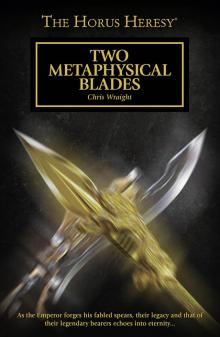 Two Metaphysical Blades
Two Metaphysical Blades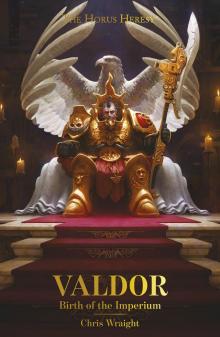 Valdor: Birth of the Imperium
Valdor: Birth of the Imperium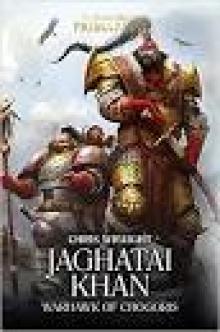 JAGHATAI KHAN WARHAWK OF CHOGORIS
JAGHATAI KHAN WARHAWK OF CHOGORIS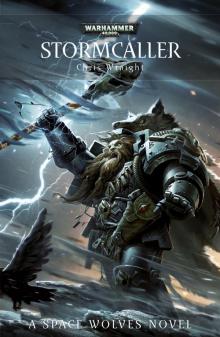 Stormcaller
Stormcaller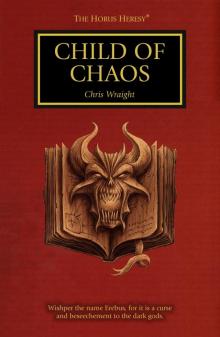 Child of Chaos
Child of Chaos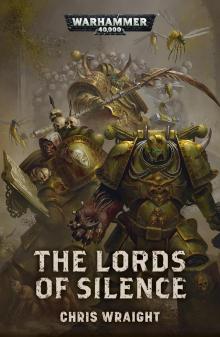 The Lords of Silence
The Lords of Silence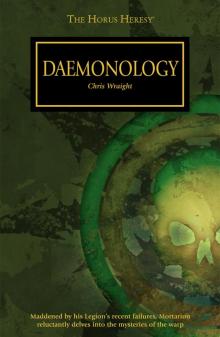 Daemonology
Daemonology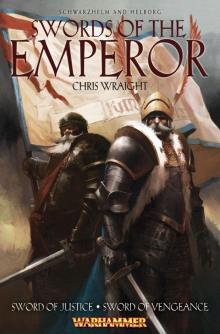 Swords of the Emperor
Swords of the Emperor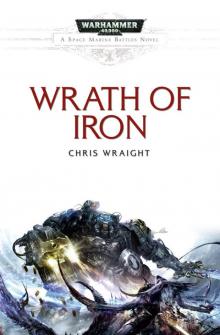 Wrath of Iron
Wrath of Iron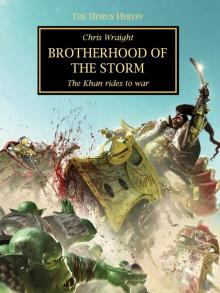 Brothers of the Storm
Brothers of the Storm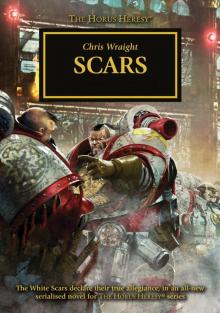 Horus Heresy: Scars
Horus Heresy: Scars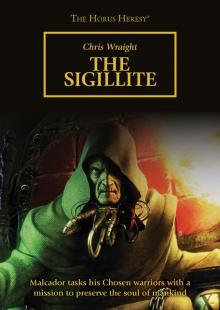 The Sigillite
The Sigillite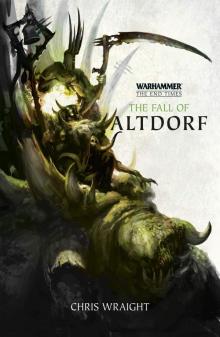 The End Times | The Fall of Altdorf
The End Times | The Fall of Altdorf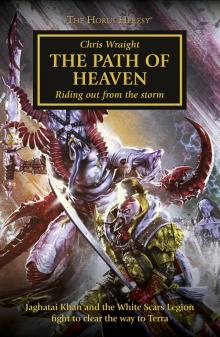 The Path of Heaven
The Path of Heaven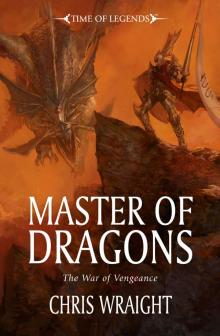 Master of Dragons
Master of Dragons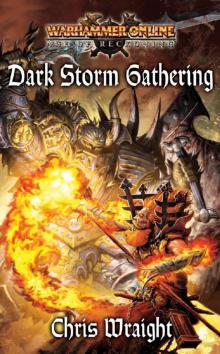 WH-Warhammer Online-Age of Reckoning 02(R)-Dark Storm Gathering
WH-Warhammer Online-Age of Reckoning 02(R)-Dark Storm Gathering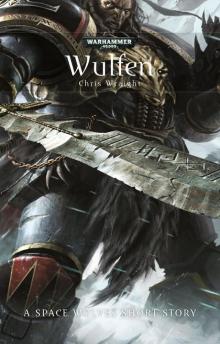 Wulfen
Wulfen Battle Of The Fang
Battle Of The Fang Onyx
Onyx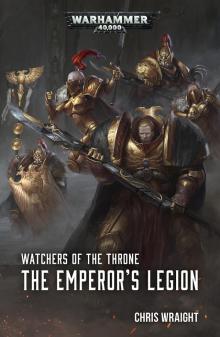 Watchers of the Throne: The Emperor’s Legion
Watchers of the Throne: The Emperor’s Legion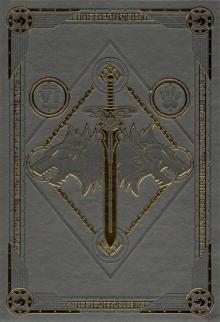 Leman Russ: The Great Wolf
Leman Russ: The Great Wolf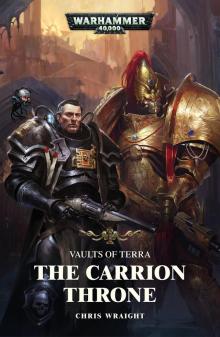 Vaults of Terra: The Carrion Throne
Vaults of Terra: The Carrion Throne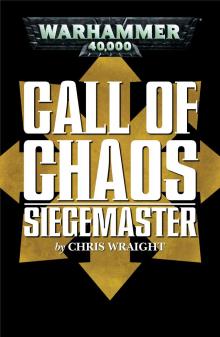 Siegemaster
Siegemaster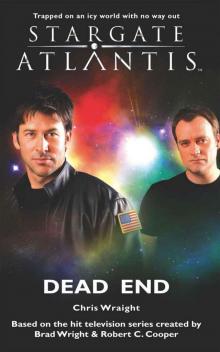 STARGATE ATLANTIS: Dead End
STARGATE ATLANTIS: Dead End Scars
Scars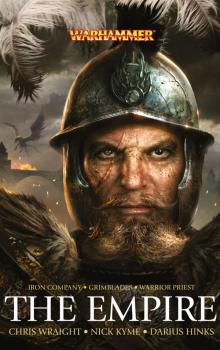 The Empire Omnibus
The Empire Omnibus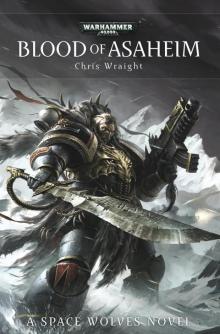 Blood of Asaheim
Blood of Asaheim